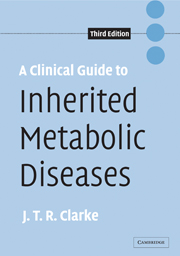Book contents
- Frontmatter
- Contents
- Reviews of first edition
- Reviews of second edition
- List of tables
- List of figures
- Preface
- 1 General principles
- 2 Neurologic syndrome
- 3 Metabolic acidosis
- 4 Hepatic syndrome
- 5 Cardiac syndromes
- 6 Storage syndrome and dysmorphism
- 7 Acute metabolic illness in the newborn
- 8 Newborn screening
- 9 Laboratory investigation
- 10 Treatment
- Index
- References
1 - General principles
Published online by Cambridge University Press: 10 September 2009
- Frontmatter
- Contents
- Reviews of first edition
- Reviews of second edition
- List of tables
- List of figures
- Preface
- 1 General principles
- 2 Neurologic syndrome
- 3 Metabolic acidosis
- 4 Hepatic syndrome
- 5 Cardiac syndromes
- 6 Storage syndrome and dysmorphism
- 7 Acute metabolic illness in the newborn
- 8 Newborn screening
- 9 Laboratory investigation
- 10 Treatment
- Index
- References
Summary
Introduction
In his 1908 address to the Royal College of Physicians of London, Sir Archibald Garrod (1857–1936) coined the expression inborn error of metabolism to describe a group of disorders – alkaptonuria, benign pentosuria, albinism, and cystinuria – which “… apparently result from failure of some step or other in the series of chemical changes which constitute metabolism”. He noted that each was present at birth, persisted throughout life, was relatively benign and not significantly affected by treatment; and that each was transmitted as a recessive trait within families in a way predictable by Mendel's laws of inheritance. In fact, alkaptonuria was the first example of Mendelian recessive inheritance to be recognized as such in humans. Garrod concluded, from the results of experiments on the effects of feeding phenylalanine and various putative intermediates of phenylalanine metabolism on homogentisic acid excretion by patients with the condition, that homogentisic acid is an intermediate in the normal metabolism of phenylalanine and tyrosine. Moreover, he observed that the specific defect was in the oxidation of homogentisic acid. La Du subsequently confirmed this 50 years later by demonstrating profound deficiency of homogentisic acid oxidase in a biopsy specimen of liver from a patient with alkaptonuria.
Following Følling's discovery of phenylketonuria (PKU) in 1934, Garrod's concept underwent a major change, particularly with respect to its relationship with disease. Like alkaptonuria, PKU was shown to be caused by a recessively inherited point defect in metabolism, in the conversion of phenylalanine to tyrosine in the liver.
- Type
- Chapter
- Information
- A Clinical Guide to Inherited Metabolic Diseases , pp. 1 - 27Publisher: Cambridge University PressPrint publication year: 2005



